 |






 

 |

 |
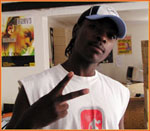

Kwaito artists Bravo and producer
DJ Cleo talk about kwaito and offer a sample of Bravo's
work. |
|
Bravo is one of the many kwaito artists
who grew up in a notoriously rough area of Soweto called Zola.
He was born Siphiwe Msimanga in 1982 and got his start performing
with friends in parks, schools, malls and finally clubs. Later,
he won the Schweppes Sparkling Granadilla Kwaito Fabulous
competition, rapping to a back up track provided by Kwaito
superstar, and fellow Zola-ite, Zola - who was also the host
of the show. The victory landed him a record deal with Ghetto
Ruff which released Bravo's
debut album Skhokho in 2004. He is also featured
on several tracks on label-mate Pitch Black Afro's debut CD
Styling Gel.
|
|
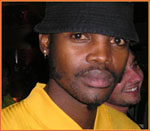 |
DJ Cleo says he's been called the Quincy
Jones of South Africa. And judging from his resume, that's
not far from the truth. He's produced songs and full CD's
for a many of the very biggest kwaito and South African hip
hop stars, including Mandoza, Mzekezke, Brown Dash, Zola,
Doc Shebeleza and Pitch Black Afro. His efforts have led to
two consecutive South African Music Association Song of the
Year awards (both tracks he produced for Mzekezeke). In 2004,
he released a CD of his own house tracks called
Es'Khaleni, a joint project of his music company
Will of Steel Productions and Ghetto Ruff Records. He says,
"All I need is that one chance produce just that one song
for any rapper, Jay-Z, Jah Rule, 50 Cents, whatever. And I
will kill it. It will become a hit worldwide. Try me. Whoever
you're going to play this to, get a hold of me." |
|
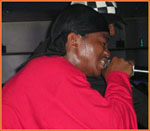

Ghetto Ruff Managing Director
Lance Stehr and artist Ishmael talk about the label's
first kwaito hit. |
|
Ishmael Morabe says he was homeless
when he met the people who would make him a star. They were
from Ghetto Ruff records and happened to find him at a nightclub
where he'd sometimes freestyle over back up tracks, staying
out as long as he could and napping in the park when need
be. Ghetto Ruff recruited Ishmael to be a dancer for its lone
group at the time - a hip hop outfit called Prophets of Da
City. In 1996, when it was clear hip-hop was not hip yet in
South Africa (at least not in terms of sales) Ishmael put
together a kwaito group called Skeem. Skeem's first single
War Was Jy became a huge hit and went on to win a South
African Music Association award. From there, Ishmael went
on to become a celebrated R&B solo artist. His fourth solo
album Long
Way Home was scheduled for release in August of 2005.
|
|
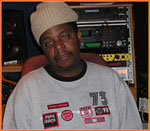

Oskido, co-owner of Kalawa Jazzmee
records, talks about how the end of apartheid inspired
the birth of kwaito. |
|
Oskido - Oscar Mdlongwa is one of the
forerunner's of kwaito. He got his start selling sausages
outside of a Johannesburg nightclub, eventually making his
way into the club to spin the closing sessions. At first he
would remix American house music tracks, slowing them down
to the speed that, he says, black South Africans were used
to dancing to. But Oskido says he eventually got bored of
doing that and ultimately started developing his own style.
Soon he gathered a following on the underground circuit with
Bruce Sebitlo and their group Brothers of Peace. When the
mainstream record labels in South Africa refused to sign him,
he created his own label, Kalawa Jazzmee. In the ensuing years,
Kalawa Jazzmee has won numerous awards and produced some of
the most popular artists in the country, including Bongo Maffin
and Mafikizolo - both of whom have had some success internationally.
|
|
|
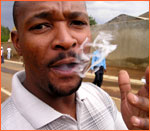 |
Mapaputsi - Sandile Ngwenya says he
was given the name Mapaputsi by an Italian shoe salesman in
Zola, Soweto where he grew up. ("Paputsi" derives
from an Italian dialect word for "shoes.") He says
it was a good name for him because, ultimately, he wants to
travel the world, telling the story of his country and spreading
South African pride wherever he goes. He began his musical
career in 1998 working with kwaito "it" groups like
TKZee and Chiskop. In 2002, he hit it big on his own with
the Ghetto Ruff release Izinja.
|
|


Niq Mhlongo reading a passage
from his novel Dog Eat Dog. |
|
Niq Mhlongo is the author of the celebrated
"kwaito generation" novel Dog
Eat Dog, which is culled from his and his friends'
experiences growing up in Soweto and attending The University
of Witwatersrand in Johannesburg. He writes, "The end of apartheid
gave rise to this new, youthful and energetic generation that
expresses itself through kwaito, Afro-pop and rap music as
well as through poetry - hence I refer to it as the kwaito
generation. This is the new national, hybrid generation that
is united in a new kind of struggle: against Aids, poverty,
xenophobia, unemployment, crime, etc." |
|


Mzekezeke expounds on the genre
of music that made him famous. Recorded at the Vaal
Institute of Technology Fresher's Ball, March 12, 2005. |
|
Mzekezeke (pron: "Mm-ZEH-geh-ZEH-geh)
is the Unknown Comic of kwaito. His real identity is unknown
as he is never seen in public without his signature balaclava
mask and yellow overalls. Mzekezeke
hails from Tembisa, north of Johannesburg. He began his career
as a recurring guest on Johannesburg radio station YFM, making
prank calls and poking fun at celebrities. Soon he was recording
his own CDs, winning awards and appearing on television. He
says he wears the mask to "represent the normal man in the
street. I'm the voice for the voiceless. I represent the poor
people of this country. I'm their voice. As you can see me
now, hear me now, I'm talking. They are not here to talk to
you. Because they are in the ghetto." |
|
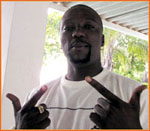

Zola gives reporter Sean Cole
an African name.
|

An extended free-style session
with kwaito superstar Zola, his producer Thaso, Ghetto
Ruff engineer Mpho Pholo (aka 37 MPH) and two of up-and-coming
rappers Zola has taken under his wing, Tuks and Slice. |
|
Zola - At a young age, Bonginkosi Dlamini
was nicknamed Zola after the rough-and-tumble section of Soweto
where he grew up. (It made sense, he says, since his uncle
was nicknamed Soweto.) Years later he would become one of
at least half a dozen kwaito stars to emerge from Zola, including
kwaito pioneer Mdu Masilela and crossover sensation Mandoza
(aka Mdu Tshabalala).
Zola is probably the most popular kwaito artist in the
country. His fame has been propelled by his hit reality TV
show Zola
7 in which he travels around the country, and sometimes
the continent, trying to solve people's problems and make
their dreams come true. In 2005, he won the South African
Music Association's Artist of the Year award. He is the owner
of the music company Guluva Entertainment and a champion of
younger performers whom he's helped into the industry. Lance
Stehr of Ghetto Ruff records calls him the second biggest
brand in the country next to Nelson Mandela.
|
|
 |
|
 |





















